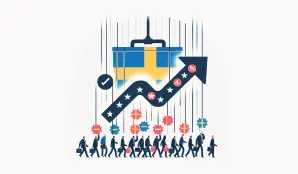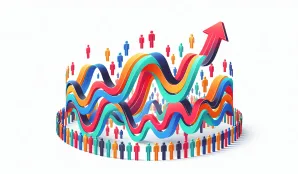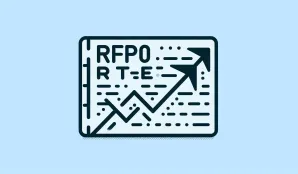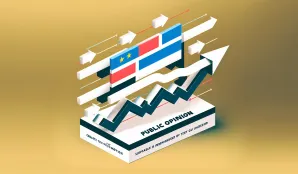Inflation
- Articles
- Inflation
New Inflation Report: KPIF Falls to 1.3% - What Does It Mean for Households?
The latest inflation report from Statistics Sweden (SCB) shows that the CPIF (Consumer Price Index with a fixed interest rate) has dropped to 1.3% in June 2024, which is a significant decrease from 2.3% in May. This is the first time in over two years that the CPIF is below the Riksbank's inflation target of 2%.
Inflation Development Over the Last 24 Months
Over the past year, we have seen a dramatic decline in inflation. In July 2023, the CPIF was as high as 6.4%, and now, a year later, it has fallen to 1.3%. Here is an overview of the CPIF's development:
- 2024-06-01: 1.3%
- 2024-05-01: 2.3%
- 2024-04-01: 2.3%
- 2024-03-01: 2.2%
- 2024-02-01: 2.5%
- 2024-01-01: 3.3%
- 2023-12-01: 2.3%
- 2023-11-01: 3.6%
- 2023-10-01: 4.2%
- 2023-09-01: 4%
- 2023-08-01: 4.7%
- 2023-07-01: 6.4%
CPI and Its Impact
The regular CPI inflation has also decreased, from 3.7% in May to 2.6% in June. CPI and CPIF are closely related, but CPI includes the effects of interest rate changes, making it more volatile.
Interest Rates and Mortgages
With the recent decline in CPIF, it is likely that the Riksbank may consider lowering the repo rate, which currently stands at 3.75%. If inflation continues to remain below the target, we can expect a rate cut as early as August.
Mortgage Calculation
Here is an estimate of what a mortgage could cost with the current repo rate and an assumed bank markup of 1%:
- Mortgage of 1 million: 4.75% interest rate, monthly cost approximately 3,958 SEK
- Mortgage of 3 million: 4.75% interest rate, monthly cost approximately 11,875 SEK
- Mortgage of 5 million: 4.75% interest rate, monthly cost approximately 19,792 SEK
Personal Loans
Personal loans are also affected by the repo rate. With continued low inflation, we may see a reduction in interest rates on personal loans, providing households with more financial flexibility.
Expectations for Food, Fuel, and Energy Prices
With lower inflation, we can expect prices of food, fuel, and energy to stabilize or even slightly decrease. This would be a welcome relief for many households that have felt the impact of high costs in recent years.
Future Outlook
If the trend of declining inflation continues, we can anticipate further rate cuts from the Riksbank. This could lead to lower borrowing costs and increased purchasing power for households, potentially stimulating the economy.
In conclusion, the latest inflation report indicates a positive development for Swedish households with lower inflation and potentially lower interest rates in the future. It remains to be seen how the Riksbank will act, but there are good reasons to be optimistic.
Sweden's national debt
-

Save Big with Vimla – Mobile Plan for 20 SEK/Month + 100 GB Extra Data
Wed, 4 Mar 2026 - 22:00 -

Opinion Poll: Demoskop February 2026 – Center increases, S still largest
Fri, 27 Feb 2026 - 09:35 -

Policy rate remains at 1.75% – Riksbank signals stability
Thu, 29 Jan 2026 - 14:02













